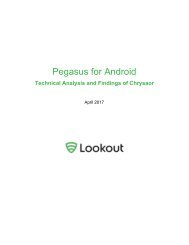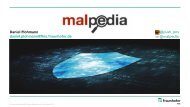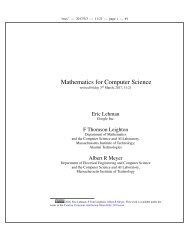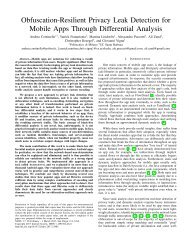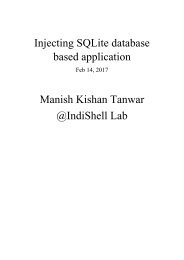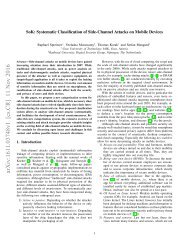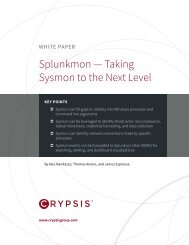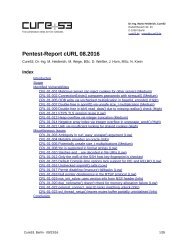Create successful ePaper yourself
Turn your PDF publications into a flip-book with our unique Google optimized e-Paper software.
deserialized, <str<strong>on</strong>g>the</str<strong>on</strong>g> object’s reference count is decremented by calling o->release(), which will<br />
lead to <str<strong>on</strong>g>the</str<strong>on</strong>g> object being free()ed in most cases. The excepti<strong>on</strong> to this behavior occurs within<br />
kOSSerializeObject objects.<br />
Since a kOSSerializeObject object represents an object that is referenced by o<str<strong>on</strong>g>the</str<strong>on</strong>g>r entries,<br />
it is necessary to retain <str<strong>on</strong>g>the</str<strong>on</strong>g> object after serializati<strong>on</strong>. As a result, during deserializati<strong>on</strong><br />
kOSSerializeObject objects will call o->retain(), <str<strong>on</strong>g>the</str<strong>on</strong>g>reby incrementing <str<strong>on</strong>g>the</str<strong>on</strong>g> reference<br />
count for <str<strong>on</strong>g>the</str<strong>on</strong>g> object and preventing its removal from memory.<br />
A serialized data blob allows for <str<strong>on</strong>g>the</str<strong>on</strong>g> same key to be used more than <strong>on</strong>ce. In o<str<strong>on</strong>g>the</str<strong>on</strong>g>r words, it is<br />
possible to have XML code that looks like:<br />
<br />
KEY1<br />
1<br />
KEY1<br />
2<br />
<br />
The above XML, <strong>on</strong>ce serialized, will c<strong>on</strong>tain five objects. The first object will be <str<strong>on</strong>g>the</str<strong>on</strong>g> dicti<strong>on</strong>ary<br />
c<strong>on</strong>tainer ( as a kOSSerializeDicti<strong>on</strong>ary object), followed by a symbol<br />
representing <str<strong>on</strong>g>the</str<strong>on</strong>g> key (as a kOSSerializeSymbol entry c<strong>on</strong>taining “KEY1”) and its data object<br />
(a kOSSerializeNumber entry for <str<strong>on</strong>g>the</str<strong>on</strong>g> integer 1). The fourth entry specifies ano<str<strong>on</strong>g>the</str<strong>on</strong>g>r key<br />
object, assigned KEY1 again, which is now a string object (kOSSerializeString) c<strong>on</strong>taining<br />
<str<strong>on</strong>g>the</str<strong>on</strong>g> string “2”. As part <str<strong>on</strong>g>of</str<strong>on</strong>g> <str<strong>on</strong>g>the</str<strong>on</strong>g> deserializati<strong>on</strong> process, <str<strong>on</strong>g>the</str<strong>on</strong>g> reuse <str<strong>on</strong>g>of</str<strong>on</strong>g> KEY1 results in <str<strong>on</strong>g>the</str<strong>on</strong>g> object that<br />
follows replacing <str<strong>on</strong>g>the</str<strong>on</strong>g> original value assigned to KEY1. This reassignment <str<strong>on</strong>g>of</str<strong>on</strong>g> a key with new data<br />
is <str<strong>on</strong>g>the</str<strong>on</strong>g> situati<strong>on</strong> where OSUnserializeBinary is vulnerable to attack.<br />
As stated previously, when an object is deserialized, and so l<strong>on</strong>g as that object is not a<br />
kOSSerializeObject, <str<strong>on</strong>g>the</str<strong>on</strong>g> object is stored in <str<strong>on</strong>g>the</str<strong>on</strong>g> objsArray for later reference. This<br />
storage is <str<strong>on</strong>g>the</str<strong>on</strong>g> result <str<strong>on</strong>g>of</str<strong>on</strong>g> <str<strong>on</strong>g>the</str<strong>on</strong>g> setAtIndex macro seen here:<br />
#define setAtIndex(v, idx, o) \<br />
if (idx >= v##Capacity) \<br />
{ \<br />
uint32_t ncap = v##Capacity + 64; \<br />
type<str<strong>on</strong>g>of</str<strong>on</strong>g>(v##Array) nbuf = (type<str<strong>on</strong>g>of</str<strong>on</strong>g>(v##Array)) kalloc_c<strong>on</strong>tainer(ncap * size<str<strong>on</strong>g>of</str<strong>on</strong>g>(o)); \<br />
if (!nbuf) ok = false; \<br />
if (v##Array) \<br />
{ \<br />
bcopy(v##Array, nbuf, v##Capacity * size<str<strong>on</strong>g>of</str<strong>on</strong>g>(o)); \<br />
kfree(v##Array, v##Capacity * size<str<strong>on</strong>g>of</str<strong>on</strong>g>(o)); \<br />
} \<br />
v##Array = nbuf; \<br />
v##Capacity = ncap; \<br />
} \<br />
if (ok) v##Array[idx] = o;<br />
Page 27




